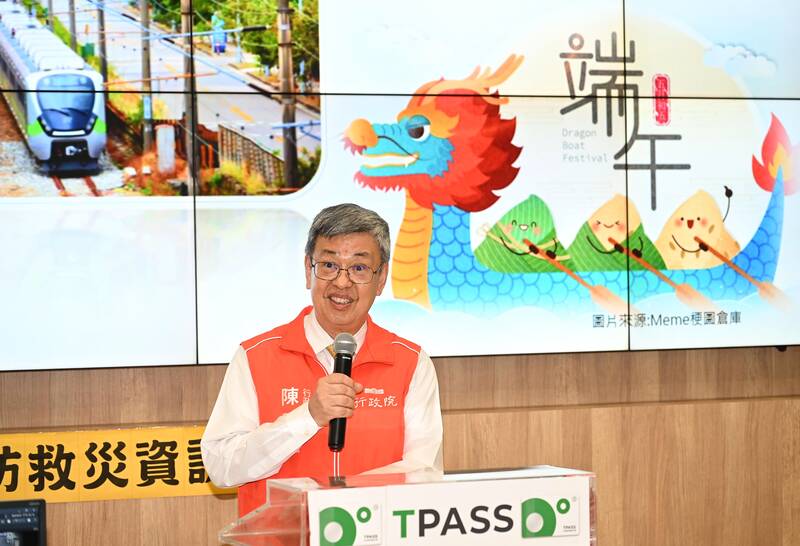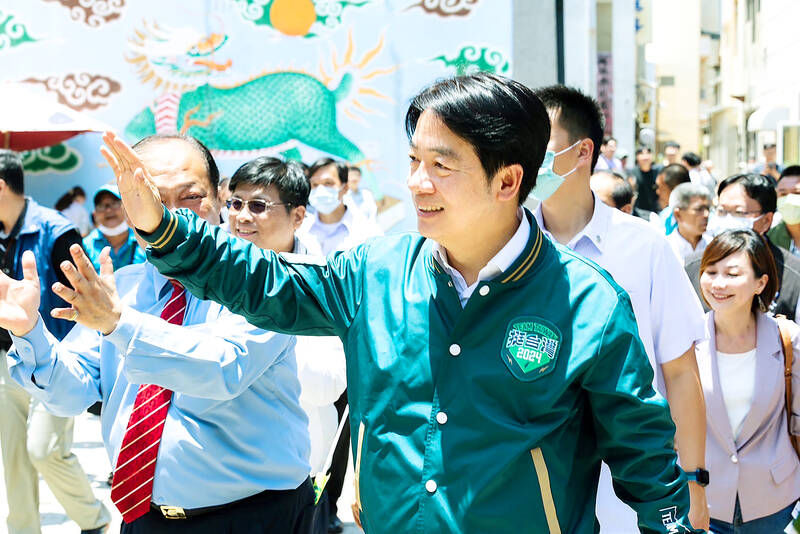Taiwan is to broaden subsidies for college tuition, make high school and vocational high schools free, and extend tuition loans, Premier Chen Chien-jen (陳建仁) said on the sidelines of an event at the Freeway Bureau’s traffic control center in Taipei yesterday.
Chen’s remarks came a day after Vice President William Lai (清德昨), the Democratic Progressive Party’s (DPP) presidential candidate, said that Taiwanese students enrolled in private colleges would receive up to NT$25,000 in tuition subsidies to alleviate their financial burden.
New Taipei City Mayor Hou You-yi (侯友宜), the Chinese Nationalist Party’s (KMT) presidential candidate, yesterday said that the proposed measure was a DPP bid to pander to voters before next year’s presidential and legislative elections.

Photo: Chang Chia-ming, Taipei Times
Chen said that President Tsai Ing-wen’s (蔡英文) administration had carefully examined the issue of education access before deciding to target tuition fees at private colleges.
Tuition costs bar many Taiwanese from pursuing the education they want at private universities and colleges, he said, adding that the subsidies are aimed at leveling the playing field and increasing fairness in education opportunities.
Separately, DPP spokesman Chang Chih-hao (張志豪) told a news conference following a session of the party’s Central Standing Committee that Lai’s latest proposals were a continuation of the vice president’s concern for giving poorer Taiwanese a fair chance to access education.

Photo courtesy of William Lai’s campaign office via CNA
Lai reduced the interest on student loans and extended the grace period for repayments during his time as premier, Chang said.
Taiwanese from low-income households often had no option other than attending expensive private colleges, which is a situation that doubly disadvantaged them, Chang said, citing Lai’s comments at the committee meeting.
The proposed measures would address those issues, Chang added.
Under current regulations, households with an income of less than NT$1.48 million (US$47,865) are exempt from paying high-school and vocational-school tuition fees, while all others must pay tuition of NT$6,240 per semester per child attending such institutions.
Under the revised rules, all households would be exempt from the fees, Chen said, adding that the policy change is expected to benefit 113,000 students.

The Central Weather Administration (CWA) yesterday said it expected to issue a sea warning for Typhoon Fung-Wong tomorrow, which it said would possibly make landfall near central Taiwan. As of 2am yesterday, Fung-Wong was about 1,760km southeast of Oluanpi (鵝鑾鼻), Taiwan’s southernmost point, moving west-northwest at 26kph. It is forecast to reach Luzon in the northern Philippines by tomorrow, the CWA said. After entering the South China Sea, Typhoon Fung-Wong is likely to turn northward toward Taiwan, CWA forecaster Chang Chun-yao (張峻堯) said, adding that it would likely make landfall near central Taiwan. The CWA expects to issue a land

Taiwan’s exports soared to an all-time high of US$61.8 billion last month, surging 49.7 percent from a year earlier, as the global frenzy for artificial intelligence (AI) applications and new consumer electronics powered shipments of high-tech goods, the Ministry of Finance said yesterday. It was the first time exports had exceeded the US$60 billion mark, fueled by the global boom in AI development that has significantly boosted Taiwanese companies across the international supply chain, Department of Statistics Director-General Beatrice Tsai (蔡美娜) told a media briefing. “There is a consensus among major AI players that the upcycle is still in its early stage,”

The Central Weather Administration (CWA) yesterday said it is expected to issue a sea warning for Typhoon Fung-wong this afternoon and a land warning tomorrow. As of 1pm, the storm was about 1,070km southeast of Oluanpi (鵝鑾鼻), Taiwan’s southernmost point, and was moving west-northwest at 28 to 32kph, according to CWA data. The storm had a radius of 250km, with maximum sustained winds of 173kph and gusts reaching 209kph, the CWA added. The storm is forecast to pass near Luzon in the Philippines before entering the South China Sea and potentially turning northward toward Taiwan, the CWA said. CWA forecaster Chang Chun-yao (張峻堯) said

‘SECRETS’: While saying China would not attack during his presidency, Donald Trump declined to say how Washington would respond if Beijing were to take military action US President Donald Trump said that China would not take military action against Taiwan while he is president, as the Chinese leaders “know the consequences.” Trump made the statement during an interview on CBS’ 60 Minutes program that aired on Sunday, a few days after his meeting with Chinese President Xi Jinping (習近平) in South Korea. “He [Xi] has openly said, and his people have openly said at meetings, ‘we would never do anything while President Trump is president,’ because they know the consequences,” Trump said in the interview. However, he repeatedly declined to say exactly how Washington would respond in